Shopping
Shopping in Trump Town: A journey to the center of the Trumpist universe
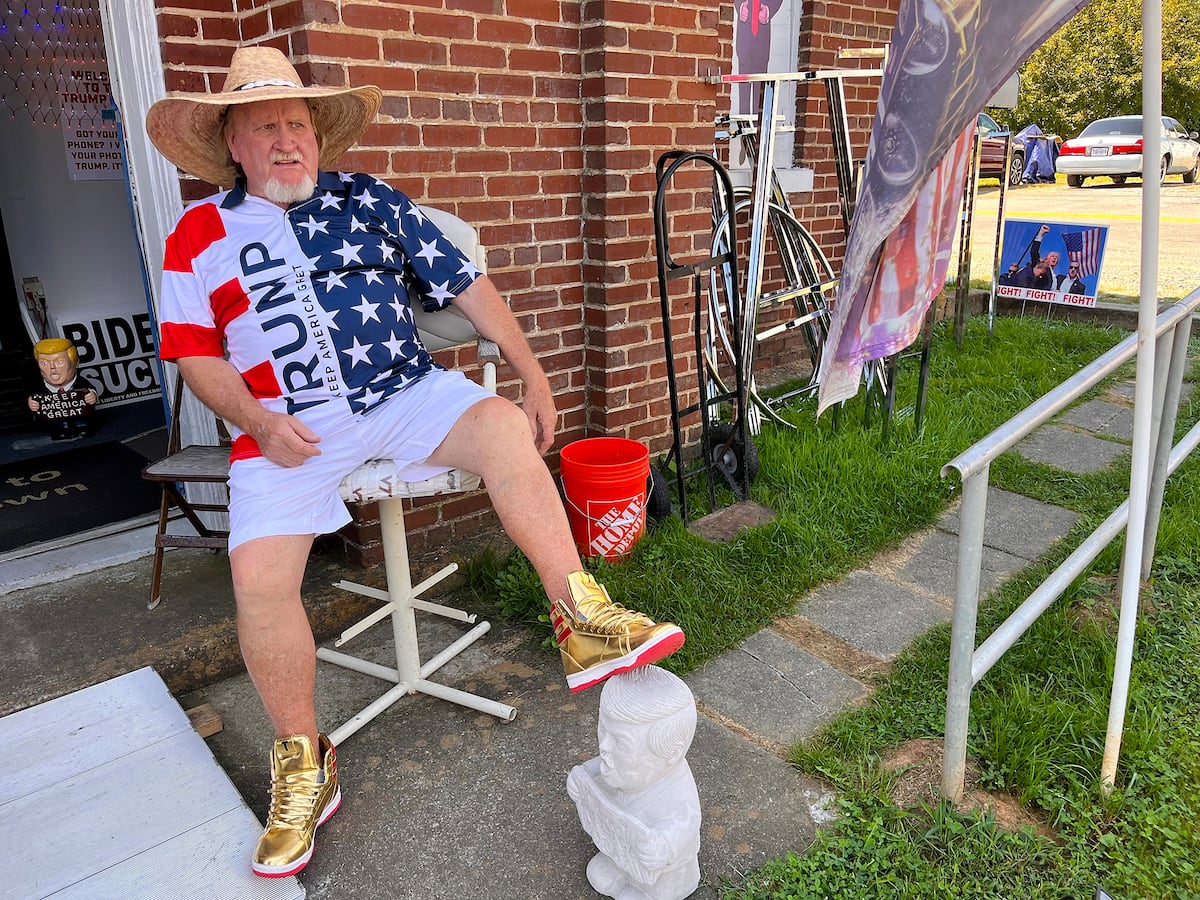
Where to start? With the inflatable pool float shaped like a tank that has the White House in the background? Or with the Donald Trump figurine that says “kiss my ass” when it has its pants down? With the life-size cardboard cutout of Melania Trump with a Confederate flag around her neck? Or with the keychain of steel testicles?
In Trump Town USA, there’s no need to choose. Almost the entire vulgar, sarcastic, violent, and conspiratorial universe of the Republican candidate’s merchandise — an extraordinarily dynamic and imaginative industry — can be found in this store in Boones Mill, a small town in Franklin County, southern Virginia, which is a quintessential piece of Deep America. Here, Trump won the 2016 and 2020 elections by more than 40 percentage points.
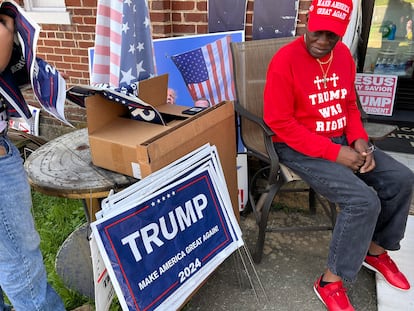
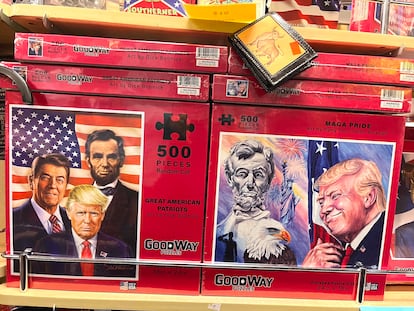
The business is housed in a former church, though the liturgy of this cult is anything but solemn. Owned by the charismatic 74-year-old Donald “Whitey” Taylor, it’s perhaps the most famous of the dozens of MAGA stores scattered across the country — testament to Trump’s exceptional role in the political history of the United States.
On the day of our visit, a lively Saturday morning at the end of summer, Taylor was welcoming customers at the door — a mix of older men, couples, and entire families, including locals and visitors from as far away as Florida. He also doubled as a walking billboard: sporting a farmer’s hat, a shirt emblazoned with the slogan “Keep America Great,” and a cheap imitation of the golden basketball shoes that Trump put on the market earlier this year, which he sells for $199, despite their “Made in China” label. “You should buy a pair; they’re a bargain,” he said, casually resting his left foot on a garden gnome shaped like the former president.
A man who identified himself as “Bruce” — not wanting to give his surname — said he had the “right” amount of interest in Trump, adding he wanted to see “this madness with his own eyes.”
Another customer, Carol Hoffman, had come with her mother from nearby Roanoke. She mentioned that they had organized a convoy of “200 or 300 cars” in support of the Republican candidate, with Taylor leading the charge in his huge black bus, adorned with the phrase “All aboard the Trump train,” that he has parked next to a lawn crowded with flags and yard signs featuring messages like “Trump Bulletproof 2024.”
Joining the visit was Antoni Miralda, an 82-year-old artist from the Spanish city of Terrassa and one of the most significant Spanish conceptual artists of the last half-century. His work has long been anchored in two intersecting ideas found in Trump Town: how objects and their collection can be valued as a creative strategy, and his enduring fascination with the United States that began during his first trips to Texas in the 1970s.
Later, Miralda gained recognition in New York, where he orchestrated an imaginary wedding between the Christopher Columbus monument in Barcelona and the Statue of Liberty. He also transformed a bar-restaurant called El Internacional into a vibrant meeting place, reflecting a golden age of the city — a memorable place that was decades ahead of the trend of pairing food and art. His most ambitious project, perhaps, is Food Culture, an extensive archive exploring the cultural implications of the act and ceremony of eating.
The artist traveled from Miami, where he has owned a home in the Haitian neighborhood since the 1990s. He was intrigued to visit Trump Town as part of a project envisioning what Donald Trump’s presidential library might look like. Since the era of Harry Truman, it has been tradition for U.S. presidents to house the archives and symbolic artifacts of their presidency in a kind of cenotaph — a concept that also fascinates Miralda. Since it is not clear that Trump will keep with this tradition — nor that he will even win the November elections — the artist has taken it upon himself to create this library for him.
His project, a collective endeavor, is called “liebrary,” an inventive neologism inspired by Trump’s complicated relationship with the truth. “It will feature a library and a museum dedicated to unraveling the vast array of lies within the Trumpian universe. There will also be a restaurant — a fast-food one, obviously — an auditorium for fake news, and a store that, of course, would have to resemble this one more than the one at MoMA.”

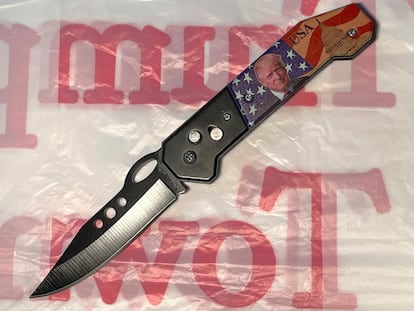
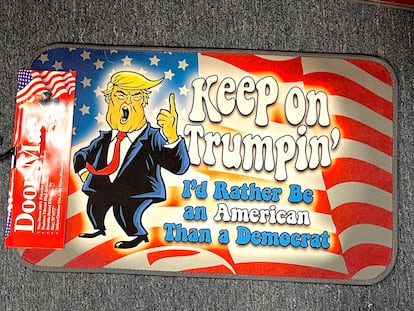
While Miralda took photographs for this report — snapping the mugs, caps, and T-shirts with slogans like “I will vote for a criminal” and images of Joe Biden sporting a clown nose — Taylor shared his story in the garden. He was frequently interrupted as customers left, prompting him to offer them the “free gift” promised by the sign on the door: a portrait of himself with a raised fist — in tribute to Trump’s reaction after surviving an assassination attempt in July — alongside a 13-foot-high cardboard silhouette of the former president giving a thumbs-up.
Taylor said that he was struck by inspiration in 2015 while he was at the Daytona racetrack in Florida with his son. “It was raining, and we had nothing to do, so we started reading the Bible. I asked him to recite Jeremiah 33. It says, ‘Call to Me, and I will answer and show you great and unsearchable things you do not know.’ My son then asked me, ‘Dad, what do you think God is telling you?’ I replied, ‘That my mission is to help Trump.’”
The businessman went on to order 1,000 Trump T-shirts and sold them at the racetrack he managed at the time. “My son thought I was crazy, but I believed in Trump from the start, when almost everyone else considered him a passing fad.” Since then, he has managed to “say hello” to his idol on three occasions.
In 2020, Taylor purchased the building. It sits in the heart of the small town of Boones Mill, with a population of just 252 people. It’s impossible to miss if you’re driving on U.S. 220. The building previously served as the headquarters of a Masonic lodge, but Taylor claims that he “asked Jesus Christ to throw them out,” and that “Jesus Christ did it.” The store officially opened in September of that year, just weeks before the presidential election.
Remarkably, the shop remained open even after Trump’s election loss and during his most challenging times. In fact, the store thrived as Trump faced mounting legal troubles. With each new indictment (he has been indicted four times, with one trial finding him guilty of 34 felony charges), sales surged. One of the most popular items continues to be a mug featuring Trump’s infamous mugshot taken in Atlanta.
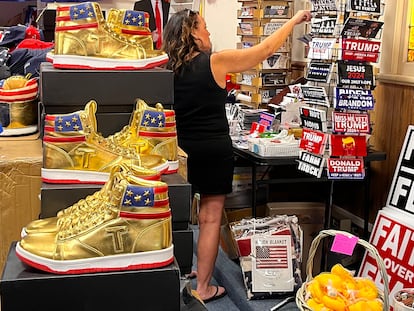
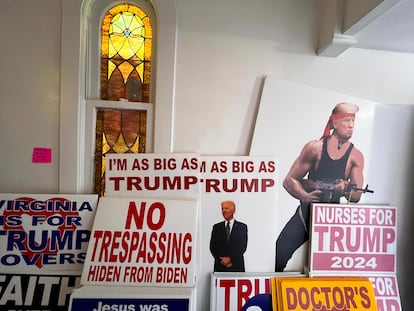
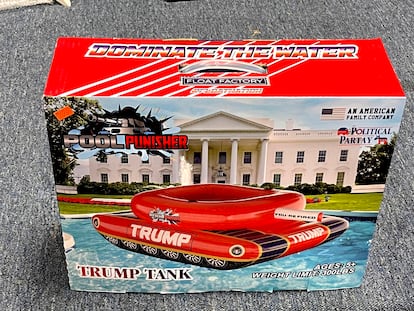
miralda
Taylor, a Pentecostal believer, firmly upholds the conspiracy theory that the 2020 election was stolen, calls Vice President Kamala Harris “a crazy woman who is just passing through,” and claims — without evidence — that the numerous legal cases against Trump are part of a “witch hunt” orchestrated by President Joe Biden. He confidently predicts a Republican victory in the next election — ”unless they steal it again” — and expresses hope that “all those corrupt people” — an estimated “500″ in his view — will end up in jail.
Despite his fervent political beliefs, Taylor comes across as more of a boastful showman than a zealot. He knows how to spin a good tale, and how to make the most of irony and his Southern drawl. His anecdotes usually include a conversation with someone to whom he ends up teaching a lesson. One such story involves a woman who once criticized him for selling Trump merchandise made in China, especially since Trump’s economic platform revolves around isolationist protectionism. His response was sharp: “I told her, ‘But let’s be real. Isn’t your cell phone made in China? Or your socks? You’re not going to throw them away, right? So don’t complain.’”
As with many MAGA thought leaders, it’s difficult to determine how much of what Taylor says is factually accurate — like his claim that he made $1 million in the store’s first year — or even how much he truly believes himself. And it’s even harder to argue with him.
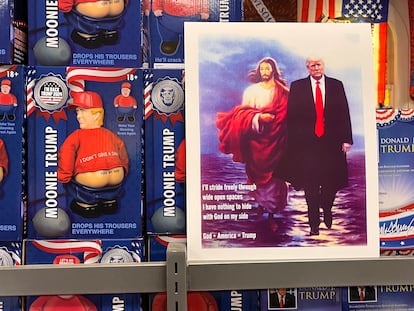
It is true that Taylor grew up in the Appalachians and settled in Franklin County in the late 1960s. It was here, while working as a roofer, that he earned the nickname “Whitey,” thanks to the bleaching effect of the sun on his straight blond hair. By 1978, he owned a racetrack, a motel in Roanoke, and a junkyard in Boones Mill. One of his most famous legal battles was with country legend Willie Nelson over a canceled concert contract. Taylor sued Nelson for $12 million but ultimately settled for just recouping the money he had paid the musician.
In 2015, Taylor left the car business to his son and devoted himself entirely to supporting Trump. According to Aaron Molina, a young Puerto Rican who lives nearby, the store has divided the town. “Half the town supports it, and the other half is against it,” he said, adding that he doesn’t mind Trump Town himself.
The biggest complaints are about the international attention the town is getting thanks to the store, as well as the logistical headaches, especially on days like the one after the July attack when, according to Taylor, “about 2,500 people arrived.” Molina also disapproves of Taylor’s idea to rename the town “Trump Town.” However, Taylor appears to relish the controversy and enjoys the spotlight. When a local customer asked his name, he pretended to be offended, saying: “The only people who don’t know me in this county are those who moved in last night.”
That same morning, Taylor was accompanied by Sebriam Vannoy, a 70-year-old Black man in a red sweatshirt with the slogan “Trump was right.” Vannoy was taking notes for his own venture. “The second African American-owned MAGA memorabilia store in the country” had just opened in nearby Christiansburg. Taylor — who does not sell official merchandise (even though Trump has marketed everything from sneakers and Bibles to chocolate bars, playing cards and photo books) — told Vannoy that his store sources from “between 12 and 15 suppliers” and that the key to success is speed.
Anything Trump says or does can become a sensation, as demonstrated by his false claims about migrants in Ohio eating pets. Taylor also shared that he designs and produces many of the yard signs himself, based on either his own or other people’s ideas. During their conversation, he paused to dictate a new idea into his phone: “A sign that says ‘Two options!’ On one side, the communist hammer and sickle, and on the other: ‘TRUMP.’”
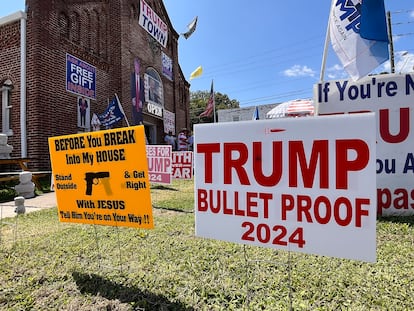
All this plywood creativity certainly complicates the job of Claire Jerry, curator of political history at the Smithsonian American History Museum in Washington. Her task during election years is to collect objects that help give “a sense of what is happening in the campaign, and that can be used in the future to decipher the present.” And with Trump, that job becomes especially tricky — how can future generations grasp everything that has happened?
Jerry doesn’t aim to collect everything for obvious reasons. “Political merchandising has a long tradition in the United States, and Trump and his followers aren’t the first to produce an enormous amount of material,” she explained in a phone interview. “The real difference lies in the enormous capacity to quickly spread messages in today’s 24/7 news cycle, the immediacy of reactions, and the ease of production that modern technology allows. And it’s not just Republicans: when the Harris coconut tree meme emerged, there were already products with messages like ‘Coconut farmers for Harris’ the very next day. Now, anyone can have a machine at home to make buttons, or has a nearby store that prints T-shirts.”
While Jerry, as a public employee, is cautious in her analysis of the November elections, she says that while attacking opponents has always been an essential part of party propaganda, the messages of this campaign may have become “less humorous.”
Back in Trump Town, Miralda pointed to several examples of this darker tone: a dartboard with Biden’s face, a poster of Trump hitting Democratic Party members with a mallet, and a magnet replacing the stars and stripes of the American flag with bullets and bullet holes. Along with a shot glass, socks, and a knife featuring Trump’s image, these items were added to the artist’s collection for his “liebrary” project in Barcelona.
As we drove away from this “terrifying and fascinating universe,” Miralda reflected on what we had seen. He described it as “a frivolous and totally vicious work of art,” and perhaps the clearest evidence that, in today’s America, “the boundaries between reality and fiction have been blurred.”
Sign up for our weekly newsletter to get more English-language news coverage from EL PAÍS USA Edition









